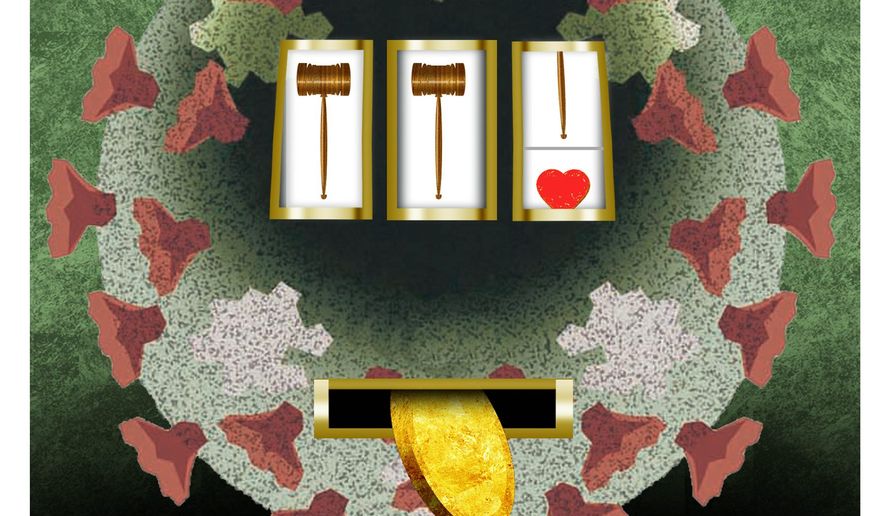OPINION:
For those across the country who fear potential lawsuits in the wake of the pandemic, hope has re-emerged.
In the waning days of the 116th Congress, another stimulus package may be delivered in a much-needed holiday miracle. Included in the bipartisan bill are imperative COVID-19 liability protections for businesses, frontline workers and health care providers.
There are 6,449 COVID-19-related lawsuit filings to date, and they don’t seem to be slowing. Of those lawsuits, nearly 60% are in states deemed “Judicial Hellholes” by the American Tort Reform Foundation or on its “Watch List.”
The ATRF’s annual Judicial Hellholes report highlights places where the civil justice climates starkly contrast the rest of the nation, as evidenced by the high percentage of coronavirus-related lawsuits.
Some of the first lawsuits filed related to COVID-19 were against manufacturers of hand sanitizers, claiming the product was ineffective.
In the early days of the pandemic, many distilleries shifted their production to ramp up supply of hand sanitizer, which was desperately needed during that critical time. They weren’t alone. Businesses and workers across the country stepped up and stepped into roles they were unfamiliar with or produced products they typically did not manufacture — all to support virus relief.
Months down the road, with the ability to look back on all this, companies that shifted their businesses overnight — and doctors who didn’t admit patients into the hospital for fear of exposure to COVID-19 — likely will face varying legal claims. Hospitals could be sued due to inadequate staff or resources.
The realization that there could be a surge of COVID-19 lawsuits, especially in Judicial Hellholes where lawsuit abuse is the norm, is setting in.
As small businesses begin the process of safely reopening, they worry about what sort of liability they might face should a patron or employee be exposed to the deadly virus on their premises.
Congress previously attempted to pass liability protections and Senate Majority Leader Mitch McConnell continues to advocate for liability protections as a priority for virus relief, but it’s yet to happen at the national level. This has left state legislatures and governors to take the lead. To date, 21 states and the District of Columbia have enacted some level of COVID-19 liability protections in addition to 23 executive orders issued by governors across the country.
In an ideal world, Congress would enact reasonable liability protections for businesses, health care providers and countless other organizations across the country to protect them from entrepreneurial trial attorneys who seek to profit from the pandemic. A national solution would create a more predictable system for all and would ease the burden on those companies that operate across state lines.
Should Congress fail in its latest efforts, states most likely will continue addressing COVID-19 liability through legislation as they go back into session in January, or governors will issue more executive orders.
But, if liability protections aren’t enacted, trial lawyers will have a heyday as the pandemic continues. In “Judicial Hellholes,” these problems will be exacerbated. In its latest report, ATRF names nine Judicial Hellholes. Of those, three have enacted some sort of COVID-19 liability protections by statute — New York, Louisiana and Georgia. The other six — Pennsylvania, California, South Carolina, Missouri, Minnesota and Illinois — have none at all. All nine are favorite jurisdictions for members of the trial bar to bring their cases.
While to date, more than 3,000 COVID-19-related lawsuits have been filed in these Judicial Hellhole states, without action, we’ll only see that number grow.
There is bipartisan consensus that additional economic stimulus is essential, and even before the pandemic, the excessive tort costs in Judicial Hellholes like California, Illinois, Louisiana and Missouri resulted in a total loss of $24.2 billion in personal income and nearly 400,000 jobs lost. Taxpayers are stuck footing the bill for a hidden “tort tax,” costing more than $760 per person each year in the most litigious states.
November polling data shows three-out-of-four Americans want to see small businesses affected by COVID-19 receive government assistance through grants or loans while a mere 7% said lawyers should help small businesses pursue legal claims instead.
Congress must take immediate action to protect small businesses, the health care industry or workers, nonprofits, schools and other organizations from COVID-19 lawsuits. It is critical to protect those on the frontlines of the pandemic. We must work together to defeat the virus and come back strong and united for all.
• Sherman “Tiger” Joyce is president of the American Tort Reform Association.




Please read our comment policy before commenting.